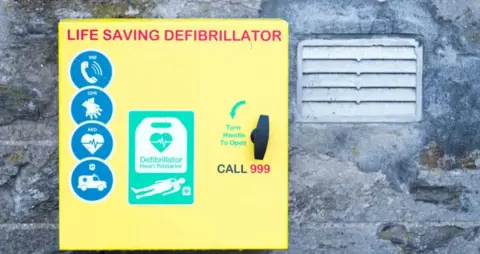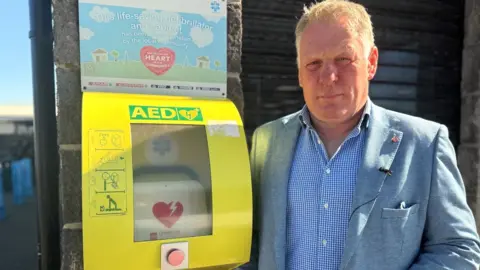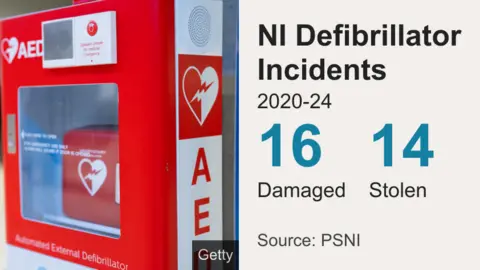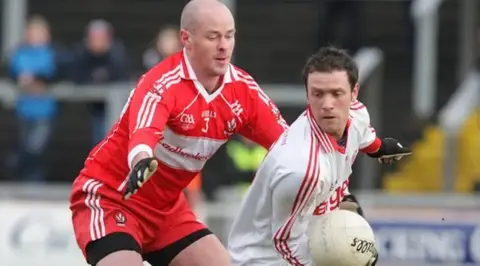Theft and damage of defibrillators has 'life or death' impact
 Getty
GettyConcerns have been raised about the number of publicly accessible defibrillators that have either been damaged or stolen in Northern Ireland in recent years.
Defibrillators are used - alongside resuscitation or CPR - to give the best chance of survival during a cardiac arrest. They give an electric charge or current to the heart to try and restore a normal heartbeat.
There are thousands of community defibrillators across Northern Ireland in places like schools, sports centres and shops.
New figures obtained by BBC News NI show that police have received reports of 30 defibrillators being stolen or damaged in the last five years.
Public access defibrillators are registered with the Northern Ireland Ambulance Service (NIAS) and are mapped so members of the public can be aware of these locations when needed during a 999 call.
They are usually kept in cabinets in prominent public locations.
Some cabinets are unlocked, while others are locked and require a code.

Johnny Finch, from Cookstown, owns a number of shops which have defibrillators that can be accessed without a code.
In the last six months, Mr Finch said many of these devices have been stolen or damaged.
Two defibrillators have been taken from shops in recent months, with one being returned following a social media appeal.
"Not only are they expensive to replace, but most importantly they're depriving the local community of an essential healthcare device," he said.
 Getty Images
Getty ImagesIn the past three months, Mr Finch said the devices in his shops had been used on three occasions.
"It just shows how important these pieces of equipment are and I can't understand what motivates people to tamper or take them," he said.
"This is life-saving equipment and when someone takes or damages a defibrillator, it's literally going to have an impact on a life or death situation."
Mr Finch said he is "reluctantly" exploring taking extra security precautions in relation to the equipment.
"We might need to look at a lock box and code, which is just really going to be chipping away at valuable time," he said.
Concerning trend
Police are still investigating some of the incidents relating to theft and damage of defibrillators at Mr Finch's businesses premises.
The PSNI said the wider trend of tampering with defibrillators is a concerning one.
PSNI Insp Wilson said: "It is thoroughly disheartening that anyone would take a chance with the life of someone else by removing these devices which were installed to benefit the entire community.
"Anyone who tampers with or steals defibrillators are committing an offence and face the very real prospect of prosecution and a criminal record."
'It saved my life'
The portable defibrillator was invented by Northern Ireland-born cardiologist, Professor Frank Pantridge, in 1965.
Former Derry Gaelic football captain, Kevin McCloy, knows all too well about the importance of the equipment.
He suffered a cardiac arrest during a club game in 2014, falling to the ground unconscious.
"I was told a few doctors came on the pitch from the crowd with the defibrillator from the clubhouse and I was brought back to life seven or eight minutes later," he said.
 Lordan Doherty
Lordan DohertyKevin's club had defibrillators at the ground as a result of a high-profile campaign following the death of Tyrone GAA star Cormac McAnallen, who died of a hidden heart condition in 2004.
Kevin said he is shocked by the latest defibrillator theft and damage figures.
"I thought one or two incidents would have been bad enough, but when you're up around the 30 mark, it's ridiculous, it's obscene.
"Whoever is doing this would need to have a good, hard, long look at themselves and think about what they're doing."

"It could be your brother, sister, mother, father that might need this equipment someday to give them a fighting chance," he added.
Mr McCloy said he understands more security measures may be needed but he is concerned about the precious time which could be lost.
In a statement a spokesperson for NIAS said: "The chance of an out of hospital cardiac arrest is already low at less than 10%, but there is a strong evidence base that early CPR and access to a defibrillator has a significant impact on increasing patient survival.
"The damage and theft of these life saving devices may have a direct impact on patients outcome and everything should be done to prevent these events."
'The Circuit' is a national online defibrillator network linking to every ambulance service in the UK.
There are approximately 3,708 permanently fixed community defibrillators registered with NIAS on the Circuit.
